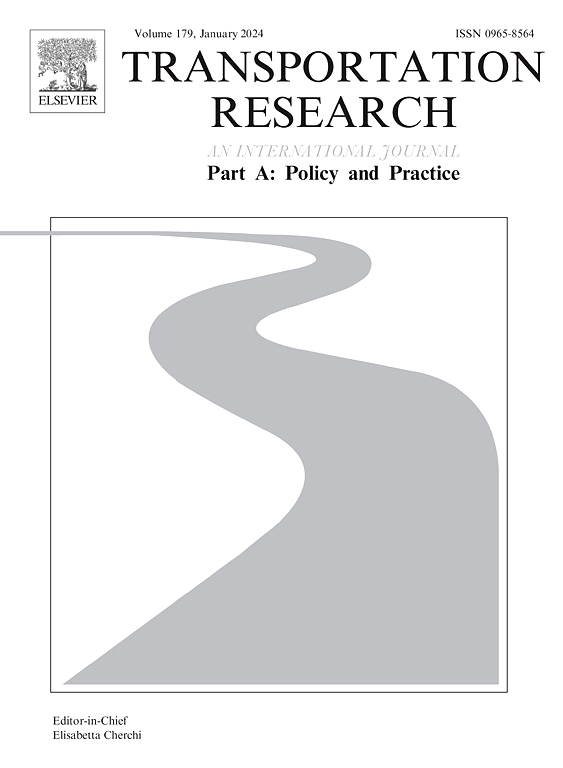Who is ready to live a car-independent lifestyle? A latent class cluster analysis of attitudes towards car ownership and usage
IF 6.3
1区 工程技术
Q1 ECONOMICS
Transportation Research Part A-Policy and Practice
Pub Date : 2024-09-27
DOI:10.1016/j.tra.2024.104271
引用次数: 0
Abstract
An excessive use of private cars for transportation has multiple negative effects on our society. It is therefore paramount to identify the underlying factors driving car usage among different segments of travellers. In this study, we aim to identify and characterise traveller segments in terms of their car-related attitudes and how different sociodemographic attributes, travel behaviour characteristics (such as using cars as the primary mode of transportation), and the accessibility of their place of residence vary amongst different population segments. Through Confirmatory Factor Analysis and Latent Profile Analysis we identify five different classes, namely car-detractors, −hesitants, −positives, −friends, and −lovers. More favourable car attitudes are associated with higher car ownership and access but, interestingly, there are no significant differences in terms of travel frequency and trip length distribution. This suggests that attitudinal differences relate mostly to modal preference rather than to the underlying travel demand patterns and the associated activities. We also see that car-less individuals are more likely to be car detractors, suggesting that the experiencing barriers for owning a car may contribute to developing more negative attitudes towards cars. Our results shed light on the different influencing factors and characteristics of individuals that consider, or not, a car-centred mobility.
谁准备好过一种不依赖汽车的生活方式?对拥有和使用汽车的态度进行潜类聚类分析
过度使用私家车作为交通工具会对我们的社会产生多种负面影响。因此,最重要的是找出不同旅客群体使用汽车的根本原因。在本研究中,我们旨在从旅客对汽车的态度,以及不同社会人口属性、旅行行为特征(如将汽车作为主要交通工具)和居住地的交通便利程度等方面,识别和描述不同人群对汽车的态度。通过确证因子分析和潜在特征分析,我们确定了五个不同的类别,即汽车憎恶者、憎恶者、积极者、朋友和爱好者。汽车态度越积极,汽车拥有率和使用率就越高,但有趣的是,在出行频率和行程长度分布方面却没有明显差异。这表明,态度差异主要与模式偏好有关,而不是与潜在的出行需求模式和相关活动有关。我们还发现,没有汽车的人更有可能成为汽车厌恶者,这表明,拥有汽车所面临的障碍可能会促使人们对汽车产生更消极的态度。我们的研究结果揭示了考虑或不考虑以汽车为中心的出行方式的不同影响因素和个人特征。
本文章由计算机程序翻译,如有差异,请以英文原文为准。
求助全文
约1分钟内获得全文
求助全文
来源期刊
CiteScore
13.20
自引率
7.80%
发文量
257
审稿时长
9.8 months
期刊介绍:
Transportation Research: Part A contains papers of general interest in all passenger and freight transportation modes: policy analysis, formulation and evaluation; planning; interaction with the political, socioeconomic and physical environment; design, management and evaluation of transportation systems. Topics are approached from any discipline or perspective: economics, engineering, sociology, psychology, etc. Case studies, survey and expository papers are included, as are articles which contribute to unification of the field, or to an understanding of the comparative aspects of different systems. Papers which assess the scope for technological innovation within a social or political framework are also published. The journal is international, and places equal emphasis on the problems of industrialized and non-industrialized regions.
Part A''s aims and scope are complementary to Transportation Research Part B: Methodological, Part C: Emerging Technologies and Part D: Transport and Environment. Part E: Logistics and Transportation Review. Part F: Traffic Psychology and Behaviour. The complete set forms the most cohesive and comprehensive reference of current research in transportation science.

 求助内容:
求助内容: 应助结果提醒方式:
应助结果提醒方式:


